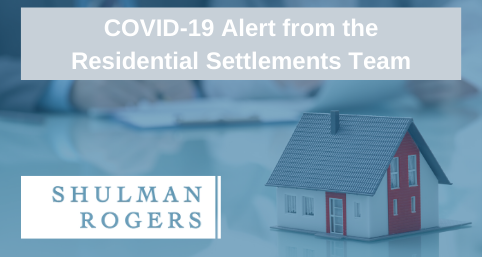
In response to the financial burdens experienced by individuals and businesses because of COVID-19, DC has passed emergency legislation providing various relief for DC residents and businesses, including a moratorium on evictions and foreclosures. Recently, the COVID-19 Response Supplemental Emergency Amendment Act of 2020 (the “Act”) was enacted, which extends additional relief to residents and businesses impacted by COVID-19 in the form of a residential mortgage and commercial mortgage deferment program.
Specifically, the Act requires mortgage lenders to develop and implement a deferment plan for borrowers of residential or commercial loans. The definition of “mortgage lender” under the Act is broad, and includes just about any entity that services a residential or commercial loan for real property located in DC. However, there are a few exceptions to the definition of mortgage lender, including the Federal Home Loan Mortgage Corporation, the Federal National Mortgage Association, and the Government National Mortgage Association.
The Act also provides an exemption for property for which a mortgage foreclosure proceeding was initiated, or for which a mortgage lender exercised its right to accelerate the loan, on or before March 11, 2020. The mortgage relief provisions are set forth in Section 202 of the Act. Pursuant to Section 202, mortgage lenders that make or hold residential or commercial mortgage loans under the jurisdiction of the Commissioner of the Department of Insurance, Securities and Banking (“DISB”) must develop and implement a deferment program for borrowers that, at a minimum: (1) grants at least a 90-day deferment of mortgage payments; (2) waives any late fee, processing fee, or any other fee accrued during the pendency of the public health emergency; and (3) does not report to any credit bureau any delinquency or other derogatory information resulting from the deferral. Mortgage lenders must make applications for the deferment program available to borrowers online or by telephone, and must approve each application in which a borrower: (1) demonstrates evidence of a financial hardship resulting from the public health emergency, including an existing delinquency; and (2) agrees in writing to pay the deferred payments within a reasonable time agreed to by the borrower and the mortgage lender, or if no reasonable time can be agreed on, then five years from the end of the deferment period, or the end of the original term of the mortgage loan, whichever is earlier. The Act does not specify what documentation may be required or may satisfy the demonstration of financial hardship; however, for each application that is denied, the mortgage lender shall provide a detailed reason for the denial in the Mortgage Deferment Status Report that the mortgage lender must provide to DISB. A person or business whose application for deferment is denied may file a written complaint with the Commissioner for formal investigation.
Borrowers also have certain obligations under the Act. If a borrower receiving a mortgage deferral has a tenant (whether commercial or residential) on the property, then the borrower shall, within five days of the approval, provide notice of the deferral to any “qualified tenant,” which the Act defines as a tenant of a property owned or controlled by a person or entity receiving a mortgage deferral under the Act that has notified the landlord of an inability to pay all or a portion of the rent due as a result of the public health emergency. Furthermore, the borrower must provide a reduction in the rent charged to any qualified tenant during the period of time in which there is mortgage deferment in place. The amount of the reduction must be proportional to the deferred mortgage amount paid by the borrower to the mortgage lender as a percentage of total expenses reported to the Office of Tax and Revenue in the borrower’s 2019 Income and Expense report. The Landlord/Borrower may require the qualified tenant to repay the difference in the amount of the rent as stated in the lease and the reduced rent, without interest or fees, within 18 months, or upon cessation of the tenancy, whichever occurs first.
DISB recently promulgated information about the residential mortgage and commercial mortgage deferral program in the form of FAQs and Guidance.
For more information regarding our Residential Real Estate Settlements Group or our general real estate transactions and litigation practice, please contact us at settlements@shulmanrogers.com.
This publication is for informational purposes and does not contain or convey legal advice. The information herein should not be used or relied upon in regard to any particular facts or circumstances without first consulting a lawyer.
Stay up to date with all the latest news and events.